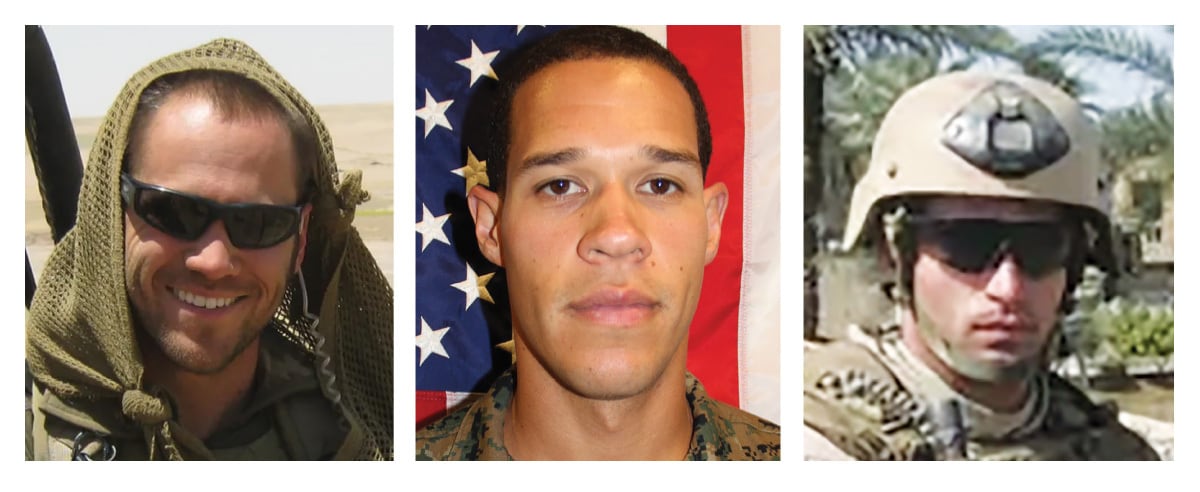A Marine judge has denied the request of two Marine Raiders facing homicide charges to dismiss their cases due to allegations of unlawful command influence.
Gunnery Sgts. Daniel Draher and Joshua Negron requested that their charges of involuntary manslaughter, negligent homicide, obstruction of justice and violation of a lawful general order and dereliction of duty be dismissed following a similar request made by co-defendant Hospital Corpsman Chief Petty Officer Eric Gilmet.
Marine Lt. Col. E.A. Catto, the judge in Draher and Negron’s case, issued his ruling on Monday.
In his opinion he mostly sided with the three-judge panel of the U.S. Navy-Marine Corps Court of Criminal Appeals, which released their ruling that reinstated charges against Gilmet on Aug. 15.
RELATED

The case
The three service members had been working with Marine Special Operations Command and were deployed to Iraq when they went to an off-base nightclub in Irbil, Iraq, to celebrate New Year’s Eve 2019.
While in the club, camera footage and later statements to law enforcement showed retired Army Green Beret Master Sgt. Rich Rodriguez, then working as a military contractor, approach the trio and begin an argument about how they were not showing him enough respect due to his rank and status in special operations.
At that point, the men waved off Rodriguez’s comments. But later, when the club had closed, Rodriguez waited outside and confronted Draher, restarting the argument.
During a brief fight, Rodriguez was knocked unconscious. The people at the club left the scene. Gilmet, Draher and Negron transported him back to base. Gilmet, a corpsman, monitored Rodriguez. Another individual at the residence, not identified in court documents, saw that Rodriguez had stopped breathing some time later. Gilmet rendered medical aid as he and the individual transported Rodriguez to the hospital. Rodriguez later died.
Threatening Statements
Gilmet’s charge dismissal request came after his then-attorney, Marine Capt. Matthew Thomas received what he reported as threats to his career for representing high profile, controversial cases.
Those threats, he’s claimed, came from the then-deputy director of the Judge Advocate Division of the Marine Corps, Col. Christopher B. Shaw, at a Nov. 18, 2021, meeting between Shaw and local military criminal defense attorneys at Camp Lejeune, North Carolina.
Shaw had been touring area facilities to meet with judge advocates general. During a planned talk, Thomas asked Shaw if defense counsel faced career challenges when representing defendants in high-profile cases.
“I know your name and I know what cases you’re on and you are not protected,” Shaw told Thomas.
Shortly after those comments, a complaint to the Marine Corps triggered an investigation of Shaw’s comments. Multiple military lawyers present filed sworn statements acknowledging that they had heard Shaw’s comments and felt that it had a chilling effect on their potential work.
The military judge in Gilmet’s case dismissed his charges in January, citing unlawful command influence.
This was after he had released Thomas and his co-counsel from the case. Both feared that they could not continue representing Gilmet without fear of reprisal in command relates to their potential future careers as Marine JAGs.
Prosecutors appealed the decision by the judge in Gilmet’s case. Attorneys for Draher and Negron filed the same requests.
Military appellate court judges heard the prosecution’s appeal on the Gilmet case in summer 2022 and reversed the lower court judge’s decision.
Draher and Negron are next scheduled for a motion hearing on Sept. 27.
Recent ruling
Both Catto and the three-judge appellate panel agreed that the prosecutors needed to show how Shaw’s comments were not unlawful command influence.
They agreed that Shaw’s comments were egregious. They also agreed that it did not constitute unlawful command influence and it did not jeopardize the defendants’ right to a fair trial.
However, Catto, in his recent ruling, noted some differences in the two cases.
The previous attorneys assigned to Draher and Gilmet did not seek to be dismissed from the case. They were dismissed at the request of the defendants, who believed that they could not proceed due to the unlawful command influence.
Though the judge in the Gilmet case ruled that enough evidence of unlawful command influence existed to release Gilmet’s attorneys, the appellate judges disagreed, saying in their August ruling that the prosecution never got the opportunity to respond to claims of unlawful command influence.
Marine Maj. Gen. David Bligh, staff judge advocate general to the commandant of the Marine Corps, immediately removed Shaw from his post, which became a permanent move later. He voiced his support for zealous defense and that such work would not have any negative effect on Marine defense attorneys.
But Gilmet’s attorney, a retired Marine Lt. Col. Colby Vokey, told Marine Corps Times on multiple occasions that Shaw’s comments have had a “chilling effect” across the Marine defense bar, and they had nearly no one in the Marine defense bar willing to take the case for the same fears outlined in the original complaint.
Bligh also assigned Marine Col. Peter D. Houtz to investigate the claims against Shaw, who was not punished beyond his removal from the deputy director position.
Houtz’ investigation noted the improper comments of Shaw but declined to categorize it as unlawful command influence.
Houtz previously served in the same office as Shaw. He also currently serves on the appeals court that ruled against Gilmet. However, he was not one of the three judges impaneled to hear Gilmet’s case.
“It is corrupt, it is dirty, it is really, really troubling,” Vokey previously told Marine Corps Times. “It’s really, really bothersome.”
*Correction: This article has been updated to clarify the people present when Rodriguez stopped breathing and required medical care and transport.
Todd South has written about crime, courts, government and the military for multiple publications since 2004 and was named a 2014 Pulitzer finalist for a co-written project on witness intimidation. Todd is a Marine veteran of the Iraq War.





